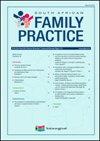The lived experiences of HIV-positive women in rural Zimbabwe: A qualitative focus group study
IF 1.2
Q2 MEDICINE, GENERAL & INTERNAL
引用次数: 0
Abstract
Background: The study explored and described the meaning attached to the lived experiences of women living with human immunodeficiency virus (HIV) in the rural context of Zimbabwe. Stigma and discrimination negatively impact one’s ability to perform the expected social roles, the quality of life, and the efforts to prevent the spread of HIV and acquired immunodeficiency syndrome (AIDS) and reduce HIV-related mortality. Thus, the study aims to understand the meaning attached to the lived experiences of HIV-positive women living in rural areas or villages of Matabeleland South province in Zimbabwe.Methods: The study used a qualitative, descriptive, and exploratory design. Four focus group discussions were conducted with 24 HIV-positive rural women living in Matabeleland South province, Zimbabwe. An Interpretative Phenomenological Analysis (IPA) was adopted to explore and describe the meaning attached to the lived experiences of women living with HIV.Results: Two interconnected themes were identified in the analysis with their sub-themes. These were: (1) struggle for social belonging, with subthemes – loss of social belonging and reduced access to community-based empowerment opportunities and (2) struggle for maintaining the quality of life with subthemes – lack of need-based community healthcare and food insecurity.Conclusion: Being a woman living with HIV in rural Zimbabwe means a perpetual struggle to maintain one’s humanness and quality of life.Contribution: This study’s results will support the efforts of the Zimbabwean government to improve the quality of life of HIV-positive women living in rural areas.津巴布韦农村艾滋病毒呈阳性妇女的生活经历:焦点小组定性研究
研究背景本研究探讨并描述了津巴布韦农村地区感染人类免疫缺陷病毒(HIV)妇女的生活经历的意义。污名化和歧视会对一个人扮演预期社会角色的能力、生活质量以及预防艾滋病毒和获得性免疫缺陷综合症(艾滋病)传播和降低艾滋病毒相关死亡率的努力产生负面影响。因此,本研究旨在了解生活在津巴布韦南马塔贝莱兰省农村地区或村庄的 HIV 阳性妇女的生活经历的意义:研究采用了定性、描述性和探索性设计。与居住在津巴布韦南马塔贝勒兰省的 24 名 HIV 阳性农村妇女进行了四次焦点小组讨论。讨论采用了解释性现象学分析法(IPA),以探索和描述感染 HIV 的妇女的生活经历的意义:分析确定了两个相互关联的主题及其子主题。这两个主题是(1) 为争取社会归属感而奋斗,次主题为社会归属感的丧失和获得社区赋权机会的减少;(2) 为维持生活质量而奋斗,次主题为缺乏基于需求的社区医疗保健和粮食不安全:结论:在津巴布韦农村地区,作为一名感染艾滋病毒的妇女,需要为保持自己的人性和生活质量而长期奋斗:本研究的结果将有助于津巴布韦政府努力改善生活在农村地区的 HIV 阳性女性的生活质量。
本文章由计算机程序翻译,如有差异,请以英文原文为准。
求助全文
约1分钟内获得全文
求助全文
来源期刊

South African Family Practice
MEDICINE, GENERAL & INTERNAL-
CiteScore
1.50
自引率
20.00%
发文量
79
审稿时长
25 weeks
期刊介绍:
South African Family Practice (SAFP) is a peer-reviewed scientific journal, which strives to provide primary care physicians and researchers with a broad range of scholarly work in the disciplines of Family Medicine, Primary Health Care, Rural Medicine, District Health and other related fields. SAFP publishes original research, clinical reviews, and pertinent commentary that advance the knowledge base of these disciplines. The content of SAFP is designed to reflect and support further development of the broad basis of these disciplines through original research and critical review of evidence in important clinical areas; as well as to provide practitioners with continuing professional development material.
 求助内容:
求助内容: 应助结果提醒方式:
应助结果提醒方式:


